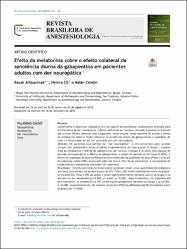Effect of melatonin on the daytime sleepiness side-effect of gabapentin in adults patients with neuropathic pain
Abstract
Background and objectives: Gabapentin is an antiepileptic drug. Widely used for the management of neuropathic pain. Although it is known to be well tolerated, somnolence and dizziness are the most frequent adverse effects. In this study, we aimed to evaluate the effect of melatonin on daytime sleepiness side effect of gabapentin, sleep quality and pain intensity of patients with neuropathic pain. Methods: Patients suffering from "neuropathic pain" and planed to receive gabapentin therapy were randomly divided into two groups. Group 1 received melatonin 3 mg and gabapentin 900 mg orally, group 2 received matching placebo capsule and gabapentin 900 mg. The Epworth Sleepiness Scale, the Pittsburgh sleep quality index for assessment of sleep quality and Verbal Rating Scale were completed at the 0th, 10th and 30th days of treatment. Additive analgesic drug requirements were recorded. Results: Eighty patients were enrolled to the study; age, gender, ratio of additive analgesic consumption, baseline Epworth Sleepiness Scale, Pittsburg Sleep Quality index and Verbal Rating Scale scores were similar between the groups. Epworth Sleepiness Scale scores, Pittsburgh sleep quality index scores and Verbal Rating Scale scores in Group 1 were significantly lower than group 2 at the 10th day of treatment (p = 0.002, p = 0.003, p = 0.002 respectively). At the 30th day of treatment, Epworth Sleepiness Scale scores and Verbal Rating Scale scores were significantly lower in Group 1 (p = 0.002, p = 0.008 respectively). However, Pittsburgh sleep quality index scores did not significantly differ between the groups (p = 0.0566). Conclusions: Melatonin supplementation rapidly and significantly improved daytime sleepiness side-effect of gabapentin, however sleep quality of the patients with neuropathic pain was similar between groups. (C) 2018 Sociedade Brasileira de Anestesiologia. Published by Elsevier Editora Ltda.


















